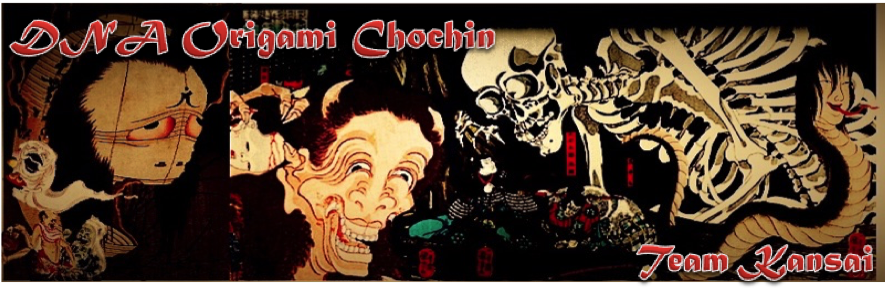Biomod/2015/Kansai/Protocols: Difference between revisions
No edit summary |
No edit summary |
||
| Line 115: | Line 115: | ||
We omitted backbone staple to design more open structure. | We omitted backbone staple to design more open structure. | ||
We constructed 3 pattern structures below. [[image:567.png|500px|right|Fig. ]] | We constructed 3 pattern structures below. They don't have backbone staples. [[image:567.png|500px|right|Fig. ]] | ||
5 without choLOCK2~19 and backbone staple | 5 without choLOCK2~19 and backbone staple | ||
Revision as of 02:27, 2 September 2015

| TOP | Team | Project | Design | Sources | Experiment | protocol |
Experiment
All staples (cho 1~180, choMD 1~20 and choEND 1~20) and the M13mp18 were mixed together and
annealed from 90˚C to 25˚C at rate of -1.0˚C/min using a PCR thermal cycler.
At first, we investigated that weather DNA origami structure has cylindrical shape.
We observed it by AFM. Figure 1 is the AFM image. It shows that almost structures have cylindrical shape.
We also performed height analysis. As a result, the height was about 5nm.
Plane DNA origami structure is about 2nm, so we judged that cylindrical shape was constructed.

In the next place, we observed Open motif (OM) and Closed motif (CM).
We prepared two type staples to close the part of mouth of chochin.
One is choLOCK that is closed perfectly opening/closing part, the other is choOM that is closed imperfectly opening/closing part. (sticky end)



First, we investigated the opening/closing of the part of mouth by changing staples.
We prepared four staple DNA mixes they close opening/closing part.
1 choLOCK2,11,18,19

2 choLOCK2,5,7,11,14,16,18,19
3 choLOCK5,7,14,16
4 all locations

We mixed cho1~180, choEND1~20, MD1,20 and M13 and annealed.
Then, we add above four mixes and pumped.
We electrophoresed with agarose gel these four samples and one is not added staple DNA to
opening/closing part (only cho1~180, choEND1~20, M13), then we observed these five bands. (Figure 2)

There was no difference from the mobility of each band in the result of agarose gel electrophoresis.
Band of DNA Origami Chochin without cho LOCK might be appeared higher than CM’s bands.
We decided to observe the structure without cho LOCK.
We designed DNA Origami Chochin without cho Lock in the middle and observed it by AFM. (Figure 3)

We counted CM in AFM image. This result show CM rate is 70%.
In spite of removing staple DNA in the middle, about 40% in CM exist as straight CM.
π-πstacking interaction can be considered a cause.
There are single-stranded DNA (16mer) in the middle. The length is 16mer ×2, 10.36 nm.
The length of between both parts are distance of one phosphate group (≒0 nm).
So, total lengths of middle parts can be about 10.36 nm.

Because of this, π-π stacking interaction strongly worked and DNA Origami Chochin was formed straight CM.
We omitted backbone staple to design more open structure.
We constructed 3 pattern structures below. They don't have backbone staples.

5 without choLOCK2~19 and backbone staple
6 choLOCK6,15
7 choLOCK5,14,7,16
We observed these structures by AFM and agarose gel electrophoresis.


As a result of agarose gel electrophoresis, we think that pattern 6 and 7 are CM,because it is no difference pattern 4 as perfect CM.
It is possible that pattern 5 is OM, because its band is higher place than these bands.
OM rate in pattern 5 is 69 %. From this, it is considered that we can construct OM by omitting backbone staple.